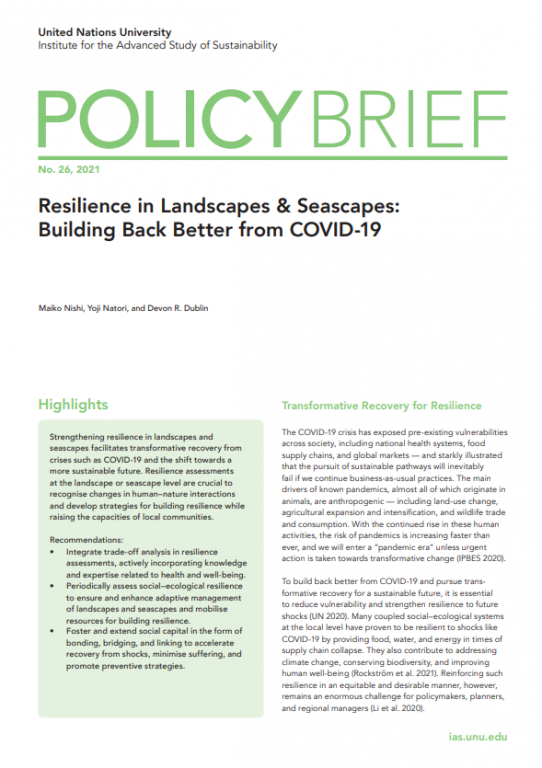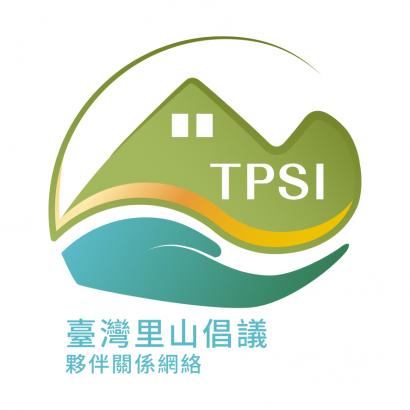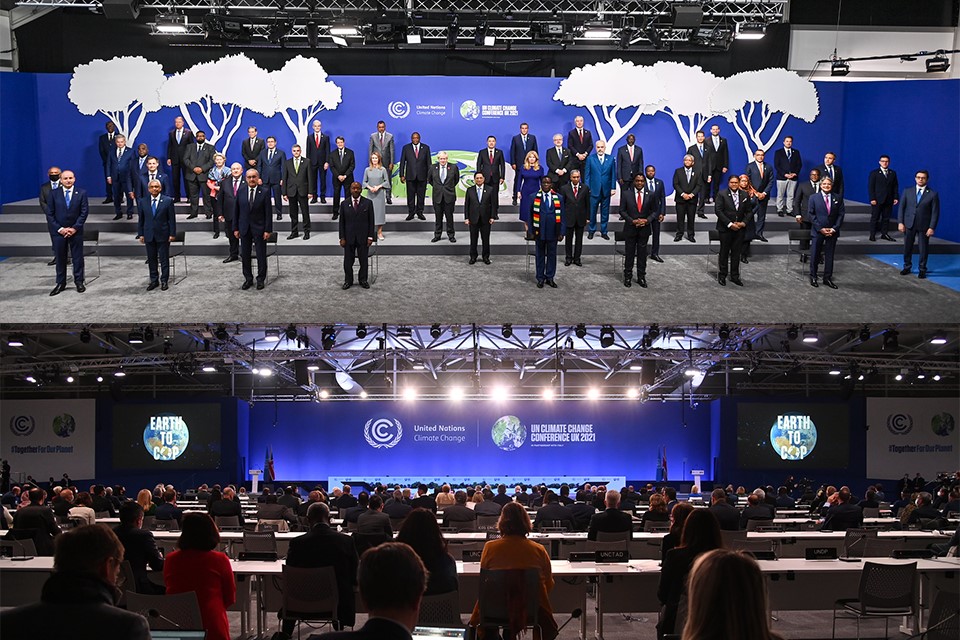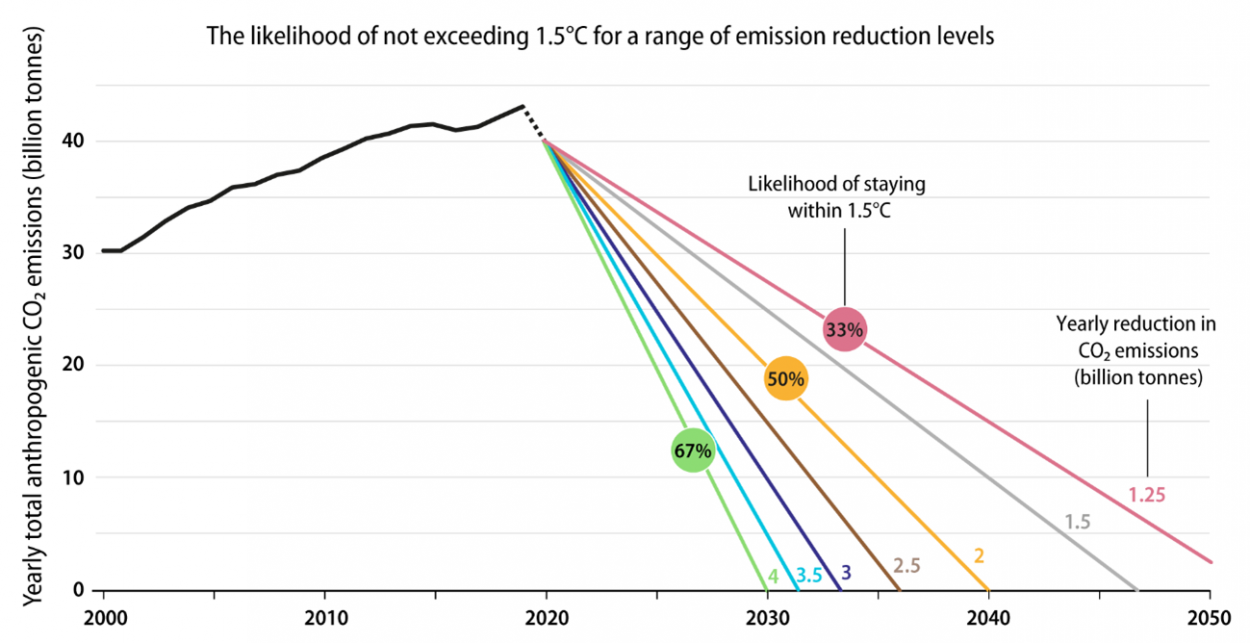IPSI Newsletter

TOPIPSI NewsletterIPSI Newsletter, November 2021
IPSI Newsletter, November 2021
2021.11.30
Dear IPSI members and friends,
Greetings from the IPSI Secretariat in Tokyo, Japan.
IPSI and its members continue to stay active in a wide variety of projects and activities related to landscape and seascape approaches towards “societies in harmony with nature”. This month’s newsletter contains an announcement of an IPSI survey; call for abstracts for the Satoyama Initiative Thematic Review Volume 8; recent publication of the UNU-IAS policy brief on ‘Resilience in Landscapes & Seascapes: Building Back Better from COVID-19’; and a reminder of the upcoming ISAP session on biodiversity with a link for registration. Also, we received an event report from the Taiwan Partnership for the Satoyama Initiative (TPSI) and cover the UN Climate Change Conference in Glasgow. Lastly, this month we introduce a case study recently submitted by the Soil and Water Conservation Bureau (SWCB) of Chinese Taipei and we introduce a new IPSI Secretariat member.
As always, please feel free to contact us to submit any new case studies or other information about your activities, or if you have any questions or comments.
IPSI Secretariat
Coming Soon: Survey on IPSI activities
Keep an eye out as your input could help us improve as a partnership and get a little closer to a sustainable future. We will send a survey to collect feedback on IPSI activities from members and those who have participated in IPSI’s activities over the past decade. Responses will be used to plan future activities and the IPSI Steering Committee and sub-committees will take them into consideration to update IPSI’s strategy and plan of action.
Call for Abstracts for the Satoyama Initiative Thematic Review Volume 8
The United Nations University Institute for the Advanced Study of Sustainability (UNU-IAS) is pleased to announce a call for papers for the eighth volume of the series “Satoyama Initiative Thematic Review”. The eighth volume will feature the theme “Ecosystem restoration through managing socio-ecological production landscapes and seascapes (SEPLS)”. Authors from the IPSI member organisations, who have case studies relevant to this theme, are highly encouraged to following the guidance provided in the call for papers.
About “TheSatoyama Initiative Thematic Review”:
The Satoyama Initiative Thematic Review is a compilation of case studies providing useful knowledge and lessons focusing on a specific theme related to “socio-ecological production landscapes and seascapes (SEPLS)”. The overall aim is to collect practical experiences and relevant knowledge, taking advantage of on-the-ground activities by practitioners while contributing to policy recommendations. Each volume also includes a synthesis chapter clarifying its relevance to policy and academic discussion to encourage the application of lessons learned in the field. Similar to the last two volumes of the publication series, Volume 8 is also planned to be published from Springer.
The Satoyama Initiative Thematic Review Vol. 8
This volume will focus on the relevance of SEPLS to aspects of ecosystem restoration. Cases to be included in the volume may highlight the roles, attitudes, and actions of multiple stakeholders, including smallholders, indigenous peoples and local communities, and others in addressing the degradation of ecosystems and restoring them for the benefit of biodiversity and human well-being through their work in SEPLS. They are also expected to provide insights on how restoration efforts at the landscape and seascape level can contribute to the local, national and global policymaking on ecosystem restoration and its implementation processes, while rendering local on-the-ground benefits for biodiversity and human well-being.
For the past volumes of the SITR, please see here.
For details on the call for papers, please see here

New Publication: UNU-IAS Policy Brief “Resilience in Landscapes & Seascapes: Building Back Better from COVID-19”
A new Policy Brief from the United Nations University Institute for the Advanced Study of Sustainability (UNU-IAS) provides recommendations for strengthening resilience in landscapes and seascapes to facilitate transformative recovery from crises such as COVID-19. The brief, Resilience in Landscapes & Seascapes: Building Back Better from COVID-19 highlights opportunities and approaches for reinforcing resilience to build back better through green recovery.
It draws from experiences and lessons learned in applying an assessment tool developed by UNU-IAS, the Indicators of Resilience in Socio-Ecological Production Landscapes and Seascapes (SEPLS). The brief is authored by Maiko Nishi from the IPSI Secretariat, Yoji Natori, and Devon R. Dublin. It is based on research conducted as part of the UNU-IAS programme Biodiversity & Society, engaging members of IPSI and other experts from across the globe.
For details, please see here.

Upcoming Event: ISAP2021 Thematic Track Session
As posted in last month’s newsletter, an online session on “Landscape Approaches for Biodiversity, Climate Change and Sustainable Development Co-benefits” will be co-organised by the Institute for Global Environmental Strategies (IGES) and the IPSI Secretariat at UNU-IAS on 2 December, 11:00-12:00 (JST), during the International Forum for Sustainable Asia and the Pacific (ISAP) 2021. With the backdrop of the IPBES-IPCC co-sponsored workshop report highlighting the interdependence of biodiversity and climate change, the session will bring together speakers with hands-on experiences from SEPLS across the world, and explores transformative actions for biodiversity, climate and sustainable development co-benefits that we should focus on in “the decisive decade for sustainability”. This session will include a keynote and framing presentation on biodiversity-climate nexus in SEPLS, followed by presentations of two case studies and a panel discussion.
Further details of the session, please see the ISAP website.
To join the sessions, please access here to register online.

Event report: “Decade of the Satoyama Initiative in Taiwan: Past, Present and Future”
A message by one of our members:
On November 12-13th, 2021 Chinese Taipei celebrated 10 years since the introduction of the Satoyama Initiative to the islandwith the “Decade of the Satoyama Initiative in Taiwan: Past, Present and Future” Conference co-organised by the Forestry Bureau, National Dong Hwa University, National Pingtung University of Science and Technology, Dharma Drum Institute of Liberal Arts, and Endemic Species Research Institute.
What a decade it was! This journey has taken us from having only one IPSI member, in 2011, to 18 in 2021, from a daring dream of having a national network of satoyama-satoumi practicioners to the establishment of the Taiwan Partnership for the Satoyama Initiative (TPSI) in 2015 (please see here for the official webpage of the “Satoyama Initiative in Taiwan” for more details).
Today, the TPSI family consists of over 220 organisations – local and indigenous communities, farmers, government agencies, academia, NGOs/NPOs, green enterprises, and other interested individuals – led by northern (TPSI-N), western (TPSI-W), southern (TPSI-S), and eastern (TPSI-E) regional exchange bases. In 2018, the introduction of Taiwan Ecological Network as the national biodiversity conservation policy provided a much-needed legal support to promote the Satoyama Initiative nationwide.
The Conference became a landmark event that granted the opportunity to review experiences and lessons of the 2011-2020 decade, assess current challenges and opportunities, and envision post-2020 trajectories for the Satoyama Initiative in Chinese Taipei.
The organisers and all TPSI family members express their immense gratitude to the distinguished international guests and dear IPSI friends who joined the Conference online: Professor Kazuhiko Takeuchi, Ms. Makiko Yanagiya, Dr. Yoji Natori, and Dr. Evonne Yiu. Their guidance and support are most deeply appreciated.
Though the conference is over, our satoyama-satoumi post-2020 journey is already in full swing. Now leading with its own logo, TPSI is, as never before, ready to embrace the new adventures that lie ahead!

A group photo

TPSI family

World Leaders Summit in Glasgow (Photo from UKCOP26.ORG)
Recent events: UN Climate Change Conference in Glasgow
The UN Climate Change Conference, held between 31 October and 13 November 2021 in Glasgow, U.K., closed with a series of decisions, including a pact to keep the 1.5 °C goal alive, and renewed commitments from leaders around the world to tackle the climate emergency. The ambition of GHG emission reduction declared by countries fell short of recommendations by experts, but the inclusion of phase down in language on coal and fossil fuels was important progress.
According to the Intergovernmental Panel on Climate Change (IPCC) Working Group I report published in August 2021, the remaining Carbon Budget to limit global warming to 1.5 °C with a 67% likelihood of success is 400Gt CO2 and 500Gt CO2 with a 50% likelihood. With yearly total emissions averaging around 40Gt CO2, the stabilisation of the climate will require strong, rapid, and sustained reductions in greenhouse gas emissions, moving towards reaching net zero CO2 emissions around 2050. In order to stay below 1.5°C warming, a recent report, ‘10 New Insights in Climate Science 2021’, points out that it is required that annual global emissions reductions average 2 GtCO2 per year and stringent reductions in emissions of non-CO2 greenhouse gases.
Among the many agreements made during the Glasgow session, IPSI members and readers of the newsletter may be particularly interested in seeing the reference to nature and ecosystems in paragraph 38 of the Glasgow Climate Pact, which says that the Conference of the Parties serving as the meeting of the Parties to the Paris Agreement:
“Emphasizes the importance of protecting, conserving and restoring nature and ecosystems to achieve the Paris Agreement temperature goal, including through forests and other terrestrial and marine ecosystems acting as sinks and reservoirs of greenhouse gases and by protecting biodiversity, while ensuring social and environmental safeguards.”
The Glasgow Climate Pact recognises the importance of nature and ecosystems services to achieve the long-term global goal under the Convention and the global goals under the Paris Agreement. The text also tried to balance out interventions from Parties requesting to include explicit references to nature-based solutions (NbS) and other Parties expressing concern that the term is not yet ready to be agreed upon. Some discussions by experts on NbS in Glasgow have also highlighted that its use can provide multiple benefits to climate, biodiversity conservation and socio-economic development, but it must not replace or delay decarbonization efforts. Investments in NbS must protect biodiversity, enhance resilience to climate change and strengthen the ability of ecosystems to act as long-term carbon sinks while maintaining the rights of indigenous peoples and local communities.

Linear reductions in global CO2 emissions and the corresponding probabilities that these would enable remaining within 1.5°C warming to preindustrial levels. Source: Future Earth, The Earth League, WCRP (2021). 10 New Insights in Climate Science 2021. Stockholm
Another important outcome of interest to IPSI members is the “Glasgow Leaders’ Declaration on Forests and Land Use”, signed by 142 Countries as of 15 November. The signatories committed “to working collectively to halt and reverse forest loss and land degradation by 2030 while delivering sustainable development and promoting an inclusive rural transformation”.
Please see for the declaration and the list of countries which the leaders have joined, and here to read about the World Leaders’ Summit on ‘Action on forests and land use’ and here to watch a video about the summit.
For a set of decisions adopted by COP, CMP, and CMA in Glasgow, see here.
For the high-level summary of the first part of the Standing Committee on Finance Forum on finance for nature-based solutions, noted by the COP, see here.
To read the Intergovernmental Panel on Climate Change (IPCC) Working Group I report, Climate Change 2021: the Physical Science Basis, see here.

Recent Case Study: “Government - Community collaboration for natural ecological sustainability-Yi Hsin Community, Nantou”
We are pleased to share a case study submitted by the Soil and Water Conservation Bureau (SWCB) of Chinese Taipei. This case study showcases the use of “demonstration farms” and a “cross-domain platform”, which enabled an easier transformation from conventional to eco-friendly farming. It also led to the protection of SEPLs in the area and worked towards the goal of “co-existence between humans and ecology”.
Activities implemented in the demonstration farms include:
- creating shelter pools for Pararasbora moltrechti, fish native to the area designated as a rare protected species in 2009 by the Council of Agriculture, Executive Yuan,
- replacing chemical fertilizer and pesticides with organic ones,
- using light to regulate production season of the pests, and
- using a green conservation label for increased water bamboo price to mitigate financial loss during the transition period.
The “Pararasbora moltrechti conservation cross-domain platform”, a multistakeholder partnership made of 17 agencies, experts, and scholars, was established in 2020. Meetings of the cross-domain platform provided knowledge and financial support towards implementing activities and showed the importance of engaging various stakeholders, including public, private, community, and academic, in working on ecosystem degradation issues.
The authors explain the successes and lessons learned through their cases, including the increased number of fish over the years, stable expansion of eco-friendly farming areas and agricultural products in the community, and the creation of an ecological tourism model into a community enterprise. Additionally, in recent years, youths returned to the community to assist in managing orchards and farms. They note the importance of education, learning from other communities, enhancing self-capabilities, and partnership between various stakeholders.
For details of the case study, please see here on the IPSI website.

Alexandra Franco at Noda, Japan
Message from New IPSI Secretariat Staff: Alexandra Franco
Dear IPSI Members,
As the new Communications Associate for the Biodiversity and Society Programme (BDS) at UNU-IAS and the IPSI Secretariat, I will strive to inform institutions, academics, and as many people as possible of the important work we do.
I was fortunate to grow up in a small city in Mexico where diverse ecosystems are part of its architecture; the bus ride to school would take me by desert mountains and green production landscapes. The problems of farmers became the city’s problems, whether it was the price of water for crops and cattle or the unexpected fall of hail in a warm season. I was taught from a young age that we, societies, are interconnected not only to each other but to the environment.
The COVID-19 pandemic has also taught us this lesson and many more. One of the most important lessons is that our struggles are not isolated; we are truly living in the era of absolute globalisation. The pandemic came quickly, catching us unprepared, and spread to the degree that no country was left unaffected. We have also learned that it takes a global effort to get through this pandemic; we do not really have permanent solutions if somebody is left behind. After almost two years we are barely beginning to recover. The pandemic’s economic, societal, and environmental impacts will linger for years. We must take these lessons and apply them to our strategies against climate change and biodiversity loss.
As Communications Associate, I look forward to working with you and shining a light on the vision we hold at IPSI, that is, realising societies in harmony with nature.
Warmest regards,
Alexandra Franco
Contact
Please be sure to let the Secretariat know if there are any changes in your e-mail address or contact information.
Secretariat of the International Partnership for the Satoyama Initiative
United Nations University Institute for the Advanced Study of Sustainability (UNU-IAS)
5–53–70 Jingumae
Shibuya-ku, Tokyo 150-8925
Japan
Tel: +81 3-5467-1212
Fax: +81 3-3499-2828
Email: isi@unu.edu
If you have been forwarded this newsletter and would like to SUBSCRIBE, you can do so on the IPSI website here.


